-
 Bitcoin
Bitcoin $82,099.5826
-1.34% -
 Ethereum
Ethereum $1,817.9545
-1.07% -
 Tether USDt
Tether USDt $0.9999
0.02% -
 XRP
XRP $2.0815
-3.96% -
 BNB
BNB $595.8647
-1.53% -
 Solana
Solana $124.0327
-0.92% -
 USDC
USDC $1.0000
0.01% -
 Dogecoin
Dogecoin $0.1634
-3.94% -
 Cardano
Cardano $0.6445
-4.65% -
 TRON
TRON $0.2336
1.34% -
 Toncoin
Toncoin $3.9381
2.61% -
 Chainlink
Chainlink $13.2201
-3.75% -
 UNUS SED LEO
UNUS SED LEO $9.0947
-5.84% -
 Stellar
Stellar $0.2646
-1.90% -
 Avalanche
Avalanche $18.6234
-3.91% -
 Shiba Inu
Shiba Inu $0.0...01214
-3.88% -
 Sui
Sui $2.2126
-6.78% -
 Hedera
Hedera $0.1604
-6.61% -
 Polkadot
Polkadot $4.0237
-1.97% -
 Litecoin
Litecoin $82.1655
-4.48% -
 MANTRA
MANTRA $6.2849
-1.13% -
 Bitcoin Cash
Bitcoin Cash $298.8203
-2.66% -
 Dai
Dai $1.0000
0.02% -
 Bitget Token
Bitget Token $4.4293
-4.57% -
 Ethena USDe
Ethena USDe $1.0000
0.01% -
 Pi
Pi $0.6976
-9.77% -
 Hyperliquid
Hyperliquid $12.5853
-0.74% -
 Monero
Monero $215.4717
-0.22% -
 Uniswap
Uniswap $5.8825
-1.85% -
 Aptos
Aptos $5.1958
-2.29%
What is the difference between "cold storage" and "hot storage" of blockchain?
Cold storage offers high security for crypto by keeping keys offline, while hot storage provides easy access but increases online vulnerability. Choose based on your needs.
Mar 29, 2025 at 02:07 am
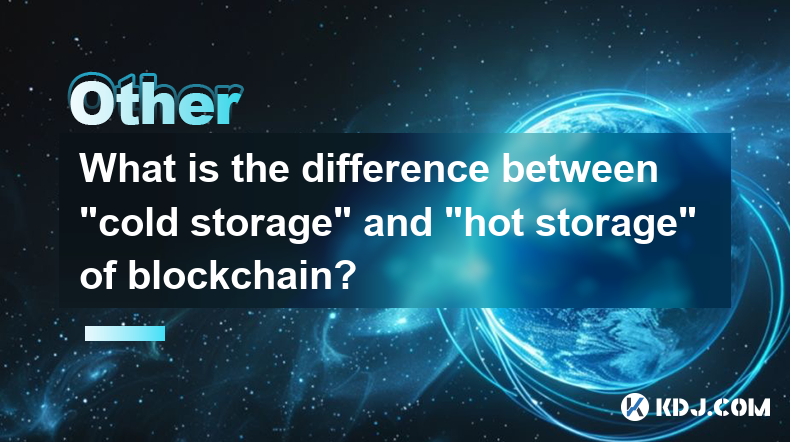
Understanding Cold Storage and Hot Storage in Blockchain
The security of your cryptocurrency holdings hinges significantly on how you store your private keys. This is where the concepts of cold storage and hot storage come into play. Both methods offer different levels of security and accessibility, each with its own set of advantages and disadvantages. Choosing the right method depends on your individual needs and risk tolerance. Let's delve into the specifics.
Cold storage refers to storing your cryptocurrency offline, completely disconnected from the internet. This significantly reduces the risk of hacking, malware, and phishing attacks, which are common threats to online wallets. The most secure form of cold storage is a hardware wallet, a physical device designed specifically for storing private keys. Other cold storage options include paper wallets (printed private keys) and offline software wallets. While highly secure, accessing your funds requires a deliberate offline process.
Hot storage, on the other hand, keeps your cryptocurrency online, connected to the internet. This provides easy and immediate access to your funds. Hot wallets are generally software wallets installed on your computer, smartphone, or accessed through a web browser. Exchanges also utilize hot wallets to facilitate trading and transactions. The convenience of hot storage comes at a cost: increased vulnerability to online threats.
The Security Spectrum: Cold Storage vs. Hot Storage
The core difference between cold and hot storage lies in their security posture. Cold storage prioritizes security above accessibility, offering the highest level of protection against external threats. Hot storage prioritizes accessibility above security, offering convenience but increasing vulnerability to online attacks. This fundamental difference shapes their respective uses within the cryptocurrency ecosystem.
Cold Storage Deep Dive: Methods and Security
Several methods facilitate cold storage, each with its unique strengths and weaknesses.
Hardware Wallets: These physical devices are considered the gold standard of cold storage. They offer a robust layer of security by isolating your private keys from the internet. Reputable manufacturers like Ledger and Trezor provide advanced security features.
Paper Wallets: These involve printing your public and private keys offline. While simple and secure if handled correctly, they are susceptible to physical damage and loss. Careful storage and handling are crucial.
Offline Software Wallets: These are software wallets that are installed on a computer that is never connected to the internet. They offer a balance between security and usability compared to hardware wallets, but require careful management to prevent accidental connection to the internet.
Hot Storage Deep Dive: Types and Risks
Hot storage, while convenient, exposes your cryptocurrency to various risks. Understanding these risks is crucial for mitigating potential losses.
Exchange Wallets: Exchanges provide hot wallets for their users, allowing for easy trading and transactions. However, exchanges are frequent targets for hackers, so storing large amounts of cryptocurrency on an exchange carries significant risk.
Software Wallets: These are applications installed on your computer or mobile device. While convenient, they are vulnerable to malware, phishing attacks, and device theft. Strong security practices are essential.
Web Wallets: These are accessed through a web browser. They offer convenience but are generally considered less secure than software wallets due to their reliance on third-party servers and potential vulnerabilities in the web application.
Practical Considerations: Choosing the Right Storage Method
The choice between cold and hot storage depends heavily on your individual circumstances. Consider the following factors:
Amount of Cryptocurrency: For larger holdings, cold storage is generally recommended due to its enhanced security. Smaller amounts might be acceptable in hot storage, depending on your risk tolerance.
Frequency of Transactions: If you frequently buy, sell, or trade cryptocurrency, hot storage offers the necessary convenience. Cold storage is better suited for long-term holders who rarely transact.
Technical Proficiency: Hardware wallets, while secure, require a degree of technical understanding. Paper wallets are simpler but riskier if not handled carefully. Software and web wallets are generally more user-friendly but less secure.
Security Best Practices Regardless of Storage Method
Regardless of whether you choose cold or hot storage, implementing strong security practices is crucial.
Strong Passwords: Use unique, complex passwords for all your wallets and accounts. Consider using a password manager to help manage them securely.
Two-Factor Authentication (2FA): Enable 2FA whenever possible to add an extra layer of security to your accounts.
Regular Software Updates: Keep your software wallets and operating systems updated to patch security vulnerabilities.
Antivirus Software: Use reputable antivirus software on your devices to protect against malware.
Beware of Phishing Scams: Be cautious of suspicious emails, websites, or messages that request your private keys or login credentials.
Frequently Asked Questions
Q: Is cold storage completely safe?
A: While cold storage significantly reduces the risk of hacking, it's not entirely foolproof. Physical loss or damage to hardware wallets or paper wallets can result in the loss of your cryptocurrency.
Q: Can I use both cold and hot storage?
A: Yes, many users employ a hybrid approach. They store the bulk of their cryptocurrency in cold storage while keeping a smaller amount in a hot wallet for everyday transactions.
Q: What is the best type of cold storage?
A: Hardware wallets are generally considered the most secure form of cold storage due to their robust security features and isolation from the internet. However, the best type depends on your individual needs and technical expertise.
Q: How often should I back up my cold storage?
A: The frequency of backups depends on the type of cold storage. For paper wallets, multiple copies in different secure locations are recommended. For hardware wallets, regular backups of the seed phrase are crucial, though the device itself acts as a primary backup.
Q: What are the risks of using hot storage?
A: Hot storage exposes your cryptocurrency to various online threats, including hacking, malware, phishing attacks, and exchange failures. The convenience comes at the cost of increased vulnerability.
Disclaimer:info@kdj.com
The information provided is not trading advice. kdj.com does not assume any responsibility for any investments made based on the information provided in this article. Cryptocurrencies are highly volatile and it is highly recommended that you invest with caution after thorough research!
If you believe that the content used on this website infringes your copyright, please contact us immediately (info@kdj.com) and we will delete it promptly.
- As Sui (SUI) Prepares to Unlock $151M, Coldware (COLD) Quietly Captures the Next Billion Users
- 2025-03-31 21:10:12
- Cryptocurrency investors are increasingly moving capital into stablecoins and tokenized real-world assets (RWAs)
- 2025-03-31 21:10:12
- Rexas Finance (RXS) Attracts Big-Money Investors From Dogecoin (DOGE) and Shiba Inu (SHIB)
- 2025-03-31 21:05:14
- The Resilience of Hyperliquid NFTs
- 2025-03-31 21:05:14
- Hut 8 Launches American Bitcoin, a New Bitcoin Mining Entity Co-founded by Eric Trump
- 2025-03-31 21:05:12
- Avalanche (AVAX) and Near Protocol (NEAR) Stumble as Panshibi (SHIBI) Emerges as the New Meme Coin Giant
- 2025-03-31 21:05:12
Related knowledge
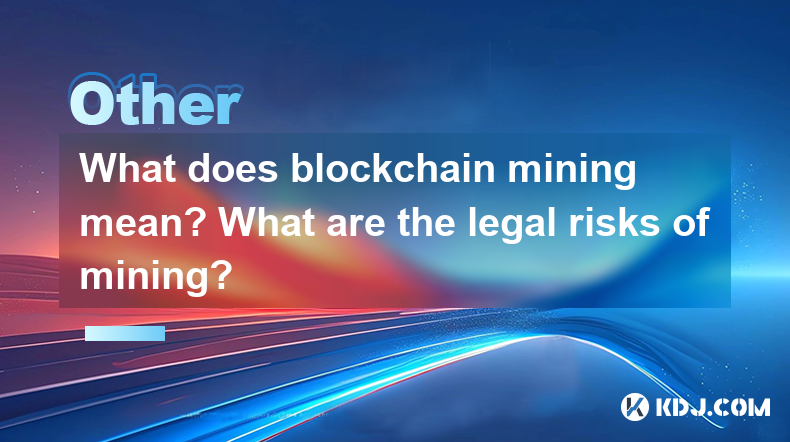
What does blockchain mining mean? What are the legal risks of mining?
Mar 31,2025 at 05:07pm
Blockchain mining is the process by which transactions are verified and added to the public ledger, known as the blockchain. Miners use powerful computers to solve complex mathematical problems, which, once solved, allow them to add a block of transactions to the blockchain. In return, miners are rewarded with cryptocurrency, typically Bitcoin. This pro...
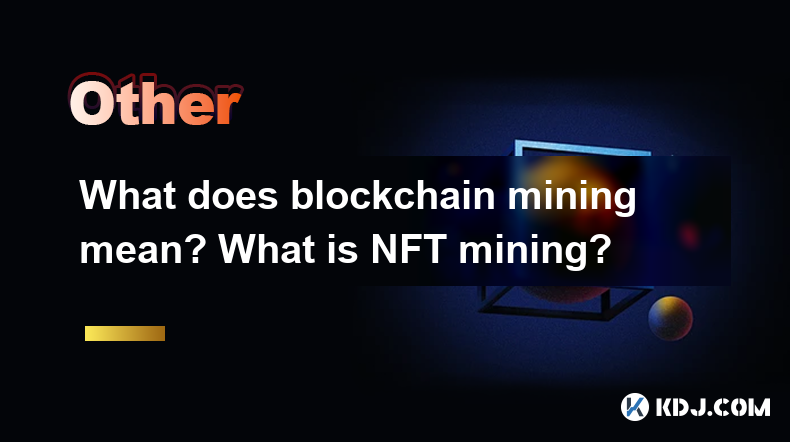
What does blockchain mining mean? What is NFT mining?
Mar 31,2025 at 04:07pm
Blockchain mining is a crucial process in the world of cryptocurrencies, particularly for networks like Bitcoin and Ethereum. It involves verifying transactions and adding them to the blockchain, a decentralized ledger. Miners use powerful computers to solve complex mathematical problems, which, when solved, allow them to add a block of transactions to ...
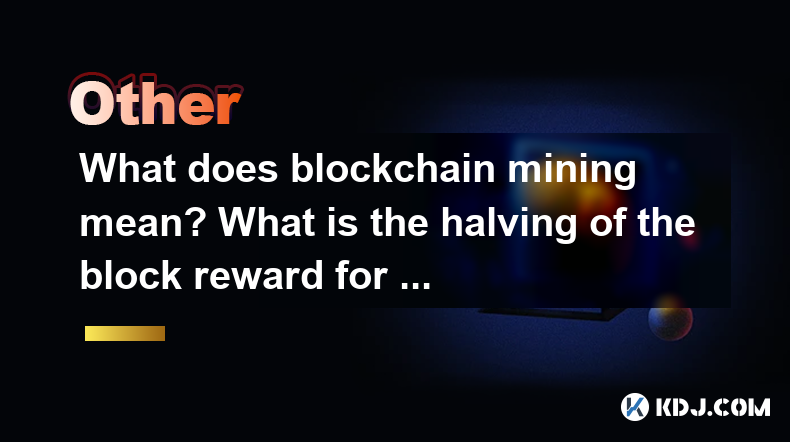
What does blockchain mining mean? What is the halving of the block reward for mining?
Mar 31,2025 at 03:43pm
Blockchain mining is a crucial process in the world of cryptocurrencies, particularly for networks like Bitcoin. It involves solving complex mathematical problems to validate transactions and add them to the blockchain, a public ledger of all cryptocurrency transactions. Miners use powerful computers to compete in solving these problems, and the first t...

How to view cryptocurrency quotes on your computer?
Mar 31,2025 at 02:10pm
The best cryptocurrency market viewing tools and methodsMany software and websites can help you track cryptocurrencies. Which tool to choose depends on your needs and technical level. From simple price tracking to advanced chart analysis, there are many options. Here are some popular options: Web application: Many exchanges offer free web-side market vi...

The relationship between block browsers and decentralized applications
Mar 30,2025 at 07:35pm
Understanding the InterplayBlock browsers and decentralized applications (dApps) share a symbiotic relationship within the cryptocurrency ecosystem. Block browsers act as crucial tools for interacting with and monitoring the blockchain, while dApps leverage this underlying blockchain infrastructure to provide their functionality. This interplay is esse...
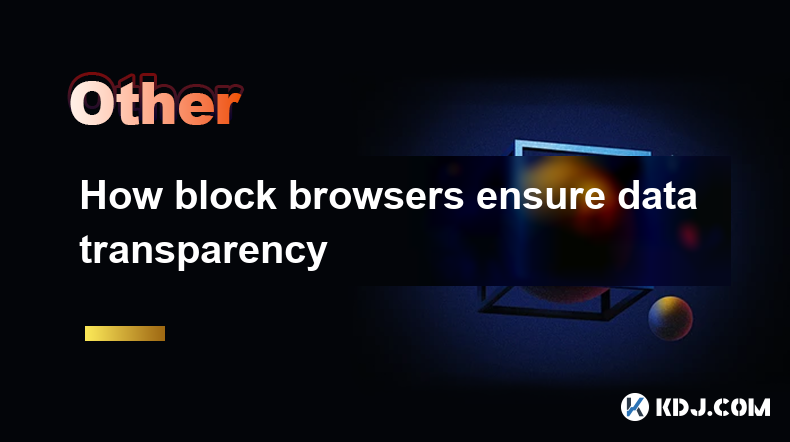
How block browsers ensure data transparency
Mar 30,2025 at 06:49am
Block browsers are designed to provide a transparent view into the inner workings of blockchain networks. Unlike traditional browsers that primarily access centralized servers, block browsers interact directly with the decentralized ledger, offering users a window into the immutable record of transactions. This transparency is a cornerstone of blockcha...

What does blockchain mining mean? What are the legal risks of mining?
Mar 31,2025 at 05:07pm
Blockchain mining is the process by which transactions are verified and added to the public ledger, known as the blockchain. Miners use powerful computers to solve complex mathematical problems, which, once solved, allow them to add a block of transactions to the blockchain. In return, miners are rewarded with cryptocurrency, typically Bitcoin. This pro...

What does blockchain mining mean? What is NFT mining?
Mar 31,2025 at 04:07pm
Blockchain mining is a crucial process in the world of cryptocurrencies, particularly for networks like Bitcoin and Ethereum. It involves verifying transactions and adding them to the blockchain, a decentralized ledger. Miners use powerful computers to solve complex mathematical problems, which, when solved, allow them to add a block of transactions to ...

What does blockchain mining mean? What is the halving of the block reward for mining?
Mar 31,2025 at 03:43pm
Blockchain mining is a crucial process in the world of cryptocurrencies, particularly for networks like Bitcoin. It involves solving complex mathematical problems to validate transactions and add them to the blockchain, a public ledger of all cryptocurrency transactions. Miners use powerful computers to compete in solving these problems, and the first t...

How to view cryptocurrency quotes on your computer?
Mar 31,2025 at 02:10pm
The best cryptocurrency market viewing tools and methodsMany software and websites can help you track cryptocurrencies. Which tool to choose depends on your needs and technical level. From simple price tracking to advanced chart analysis, there are many options. Here are some popular options: Web application: Many exchanges offer free web-side market vi...

The relationship between block browsers and decentralized applications
Mar 30,2025 at 07:35pm
Understanding the InterplayBlock browsers and decentralized applications (dApps) share a symbiotic relationship within the cryptocurrency ecosystem. Block browsers act as crucial tools for interacting with and monitoring the blockchain, while dApps leverage this underlying blockchain infrastructure to provide their functionality. This interplay is esse...

How block browsers ensure data transparency
Mar 30,2025 at 06:49am
Block browsers are designed to provide a transparent view into the inner workings of blockchain networks. Unlike traditional browsers that primarily access centralized servers, block browsers interact directly with the decentralized ledger, offering users a window into the immutable record of transactions. This transparency is a cornerstone of blockcha...
See all articles






















































































